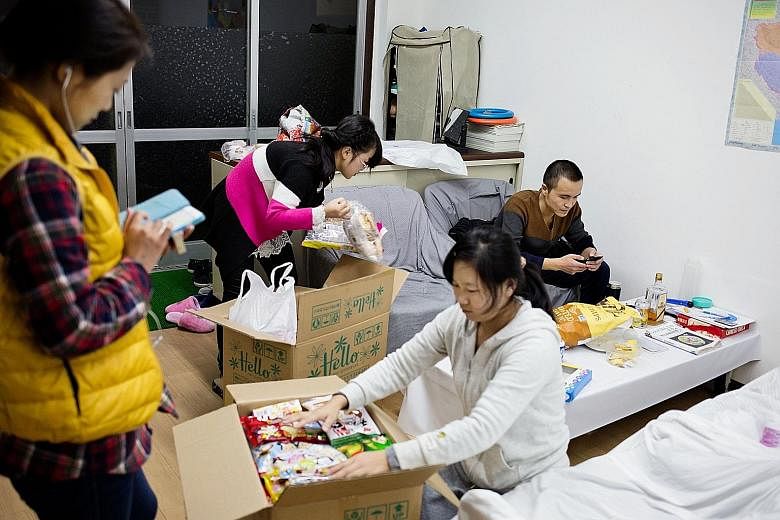GIFU (Japan) • Ms Liu Hongmei was fed up with her job at a Shanghai clothing factory, where she worked long hours for little pay.
So, three years ago, she quit to take a job in Japan.
A garment factory there promised her three times her Chinese wage, and she hoped to save thousands of dollars for her family, which was growing, with the recent birth of a son. "It seemed like a big opportunity," she recalled.
What Ms Liu did in Japan, however, is not exactly work. Legally, the time she spent ironing and packing womenswear is considered "training". She had entered the murky and at times abusive world of Japan's technical trainees - essentially second-class labourers brought in from abroad to fill jobs that Japanese citizens are not taking.
Just like the United States and other developed countries, Japan has a hard time finding people to pick vegetables, collect nursing-home bedpans and wash restaurant dishes.
Japan has very little illegal immigration and is officially closed to people seeking blue-collar work.
Now, though, its tough stance on immigration - legal and illegal - is causing problems. Many Japanese industries are suffering from severe labour shortages, which have helped put a brake on economic growth.
This is prompting Japan to question some fundamental assumptions about its labour needs. The debate is politically delicate, but changing realities on the ground are forcing politicians to catch up.
Japan's total foreign-born labour force topped one million for the first time last year, according to the government, lifted in part by people entering the country on visas reserved for technical trainees.
That growth has also led to a rise in cases of worker abuse and fraud, labour activists say.
Ms Liu is part of that debate. She arrived in Japan in debt after paying brokers US$7,000 (S$9,940) to arrange her visa. Once there, she said, she found onerous working conditions and lower-than-promised pay.
Ms Liu and other Chinese workers at her factory came to Japan through a government-sponsored internship programme. Its purpose is to square the circle between Japan's labour shortage and its ban on low-wage immigration.
Farms, food-processing businesses and many manufacturers would struggle to stay afloat without foreign trainees, specialists say.
"Practically every vegetable in the supermarkets of Tokyo was picked by a trainee," said Dr Kiyoto Tanno, a professor at Tokyo Metropolitan University.
To appease business groups, the government has created immigration loopholes, and hundreds of thousands of low-wage workers like Ms Liu have poured through them. They come from China and Vietnam, Cambodia and the Philippines, and they are filling empty jobs in Japan as the Japanese population shrinks, becoming a crucial, if under-acknowledged, motor of the economy.
Their numbers are soaring. The trainee programme has doubled in size in the past five years, to more than 200,000, according to official data, and the government is planning to expand it. The biggest source of workers has been China, but much of the recent growth has come from Vietnam.
Few doubt that "training" is a fig leaf. Beyond a short period of language study, most trainees receive little or no instruction that would distinguish them from regular manual labourers, say specialists and participants.
"The system is like calling a crow white," said Member of Parliament Yoshio Kimura from the governing Liberal Democratic Party, who heads the party's labour committee. "What we're really doing is importing labour. If we want economic growth in the future, we need foreigners," Mr Kimura said.
Lawyer Nobuya Takai, who has represented foreign trainees in labour disputes, said the pretence that trainees are not workers contributes to problems. Companies do not hire them directly, but through a system of government and private-sector middlemen. Most trainees end up thousands of dollars in debt to pay broker fees before they even arrive.
And because trainees cannot easily switch jobs - their visas tie them to a single firm - they lack what should be major leverage: the ability to walk out on a bad employer.
In 2011, a US State Department report on human trafficking flagged the trainee programme for inadequate protections against "debt bondage" and other abuses.
When trainees do not save enough to repay broker fees, they sometimes stay on illegally. Almost 6,000 did so in 2015, according to Japan's Justice Ministry.
NYTIMES

